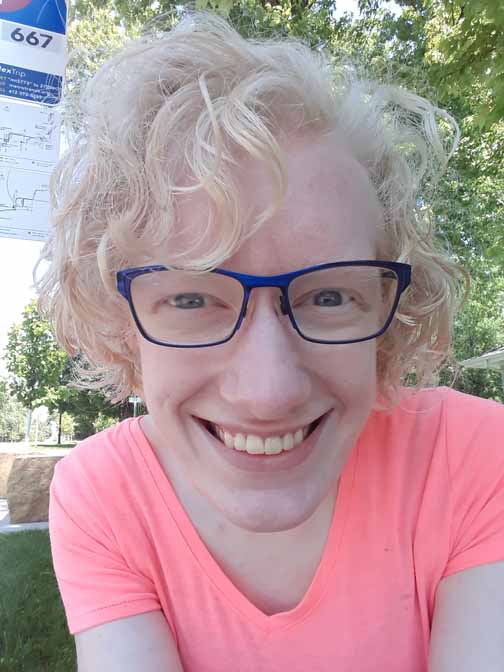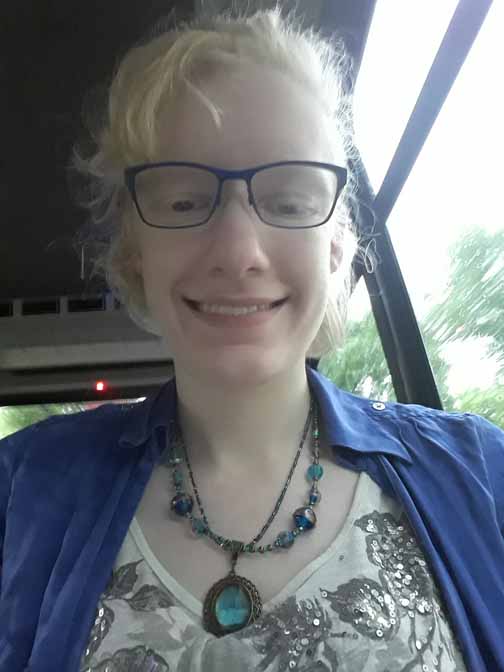Which do you choose?
By: Rachel

That subtle blush of the other person versus the honest over-asked question. Which do you choose?
I know that I have said that I’d rather be asked an awkward question then have someone just be silent when I tell them about my disability. That’s still true overall, and at the same time, some questions get asked so often and in such the same way every time that I feel frustrated.
The questions are old acquaintances. They follow me around like stickers you catch in the long grass. They’ve grown up with me through the years, bringing a wheelie suitcase with them, full of the emotions I felt when the questions came at age 9, at age 13, at age 18, and today. Every time the question gets asked again and again and again I feel all the feelings again and again and again, but this time, they are mixed with new feelings, so the process I go through afterwards is much more complex.
I am really not sure why people think they can just comment about my appearance as if I’m an exhibit in the zoo. Today someone asked very curiously if I tan. Of course I said no, not very much, and the person asked with sympathy, “You just can’t?”
“Not very much. Can you?”
It’s okay to ask questions. I don’t want to make people scared of having a reaction from me. It’s better than the silence I get when I tell someone I have albinism or borderline personality disorder. They avert eye contacts and say some cliche like oh that’s what I have, or that’s too bad, and then they change the subject.
I guess today at work I had both reactions/questions, so it just hit me harder than usual.
Part of it is the wide-eyed wonderment on a child’s face when the question is asked, except that an adult is asking the question.
I felt a little exotic today, like a sample representation of albinism.
Other questions I receive in some form are, are you albino? Why don’t you have red eyes? Are your parents albino? You must not have it very bad, because I didn’t know, and your eyes aren’t pink. Is your hair naturally that color? Do your parents have blond hair? Do your parents have light skin? And probably one of the worst was when my insecure self was in high school, keeping my albinism a secret, and one girl in a van ride with me kept asking why my skin was so “bleach white”? And she kept repeating those two words, over and over again, etching them and to my memories of hurt and my feelings of being irreparably different.
Of not sharing something with the rest of humanity. Of being asked questions but no one would ask a “normal” person.
So I will just answer the questions now, and hopefully everyone well read them and think of some different questions to ask, or maybe even just change the tone in which you ask them. Just out of trying to be my friend instead of curiosity.
Yes, my hair is this natural color. Yes, I know that I am the luckiest person in the world to not have to dye my hair. But by the way, no one has to dye their hair, and everyone has Gorgeous Hair. I don’t care who you are.
No my skin does not tan. Well, attends a tiny bit in the summer, my mom says, but I can’t really tell. And you probably can’t either.
No, my parents do not have albinism, they do not have blond hair, except for my dad’s eyebrows, they do not have fair skin in my opinion, although my version of bear and dark skin is different from a lot of people’s, and no, none of my ancestors had albinism that we know of. Albinism is a recessive create, which means that if two people carry the gene, they won’t show it, but their offspring will have a 25% chance of having albinism. Many, many families are surprised when their child pops out much later than everybody else that has ever been photographed in any family picture.
Yes, I am albino, and at least in the US it’s probably best to go with person first, so it would be better to say, do you have albinism? And when talking about a person with albinism, yes, that is the best way to talk about us, even though it’s a mouthful. I would feel so loved if people would correct people about albino. There has been so much effort to get rid of the r word, and to say a person with a disability instead of a handicapped person, and with the exception, usually, of blind and deaf, to say person with _____. We are all people, and it’s not really such a Great Divide. Some people are a little overweight. Some people have freckles, some people have a Widow’s Peak, some people have cowlicks. Some people have albinism. Some people have Down syndrome. Some people have a chromosome deletion.
Just a clarification that I’m not saying everyone has some sort of disability. I’m just saying everyone is a person with aspects about himself or herself that are true, that are positive, that are negative, that are neutral, that are unique, that are hidden, and that are visible.
Yes, please keep asking questions. Don’t give me silence when I tell you that I have those scary words like a disability, or albinism, or borderline personality disorder, or depression. I know those are big things that might be scary to hear because they are unique, and some of those things are very rare. Maybe you’ve never met someone with albinism or with a personality disorder. We aren’t scary. We aren’t a museum. We are people. We are designed by God. And all of us, and you, and me, and everyone you know, should be respected, no matter if people have respected you or not. And that attitude of respect is contagious.


